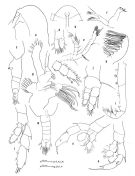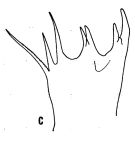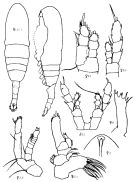|
|
 |
|
Calanoida ( Order ) |
|
|
|
Arietelloidea ( Superfamily ) |
|
|
|
Augaptilidae ( Family ) |
|
|
|
Euaugaptilus ( Genus ) |
|
|
| |
Euaugaptilus hyperboreus Brodsky, 1950 (F,M) | |
| | | | | | | Syn.: | Euaugaptilus elongatus : Roe, 1972 (p.299, 306, 311); 1972 c (p.1035) | | | | Ref.: | | | Brodsky, 1950 (1967) (p.383, figs.F,M, Rem.); Vidal, 1971a (p.178, 186, figs.F,M); Matthews, 1972 (p.33); Tanaka & Omori, 1974 (p.224, figs.F, Rem.); Roe, 1975 (p.360, figs.F,M, Rem.); Vives & Shmeleva, 2007 (p.221, figs.F,M, Rem.) |  issued from : O. Tanaka & M. Omori in Publs Seto Mar. Biol. Lab., 1974, XXI (3/4). [p.222, Fig.13]. Female: a, forehead (latezral); b, rostrum (frontal view); c, last thoracic segment and urosome (lateral left side); d, furca; e, A2; f, Md; g, Mx1; h, Mx2; i, Mxp; j, P1; k, endopod of P2; l, P5. Nota: The urosome segments and furca are in the proportional lengths as 47:11:14:28 = 100. Prosome and urosome are in the proportional lengths as 74:26. Male: m, last thoracic segment and urosome (dorsal); n, left P5; o, right P5. Nota: The urosome segments and furca are in the proportional lengths as 22,14,12,9,14,29 = 100. Prosome and urosome are in the proportional lengths as 74:26. Left A1 extends beyond the end of the furca by distal 2 segments.
|
 issued from : O. Tanaka & M. Omori in Publs Seto Mar. Biol. Lab., 1974, XXI (3/4). [p.198, Fig.1,c]. Female: c, mandibular teeth.
|
 Issued from : K.A. Brodskii in Calanoida of the Far Eastern Seas and Polar Basin of the USSR. Opred. Fauna SSSR, 1950, 35 (Israel Program for Scientific Translations, Jerusalem, 1967) [p.384, Fig.272]. Female (from central part Arctic): habitus (dorsal and left lateral side); R, rostrum; A2; M, Md (masticatory blade); Mx, Mx1; S1, P1; S5, P5. Male: S5, P5.
|
 issued from : H.S.J. Roe in Bull. British Mus. (Nat. Hist.) Zool., London, 1975, 28 (7). [p.359, Table I]. Male (Canarias Is.): a, A2; b, mandibular palp of Md; c, masticatory edge of Md; e, Mx2; f, Mxp; g, P5. Bar scale 0.1 mm unless indicated. Nota: This species and E. elongatus are closely related; these two species show consistent differences, especially in the number of endopodite setae on the Mx1 and Mx2.
|
 issued from : H.S.J. Roe in Bull. British Mus. (Nat. Hist.) Zool., London, 1975, 28 (7). [p.361]. Number of endopodite setae on the Mx1 and Mx2 of E. hyperboreus and E. elongatus. Nota: In the course of the present work the author borrowed a male and a female specimen of E. elongatus from the Oceanographic Museum, Monaco, both of which were taken at 'Pricesse Alice' . These specimens and the present ' Discovery' material confirm the differences in the setation of the Mx1 and Mx2 observed by Tanaka & Omori (see in Table I). Slight variation occurs in the setation of the Mx1 endopodite of E. hyperboreus, but none of the present specimens, nor those examined by Tanaka & Omori, have 3 setae on this lobe. Some differences are also present in the setation of the 2nd basipodite of the Mx1, where the 'Dicovery' male has 3 setae on the left side but 4 on the right. Similar variations occurs on the endopod of the Mx2 of the male E. elongatus from Monaco (Table I). The specimens of E. hyperboreus have a spinous ridge at the base of the external exopodite spines of the P1 as described by Tanaka & Omori.
| | | | | Compl. Ref.: | | | M.W. Johnson, 1963 (p.89, Table 1, 2); Harding, 1966 (p.17, 71); Dunbar & Harding, 1968 (p.315, 319, Rem.: 324); Roe, 1972 (p.277, tabl.1 ?, tabl.2 ?); 1972 c (p.1035: Rem.); Vives, 1982 (p.294); Lozano Soldevilla & al., 1988 (p.60); Kosobokova & Hirche, 2000 (p.2029, tab.2); Auel & Hagen, 2002 (p.1013, tab.2); Kosobokova & al., 2007 (p.919, Tab.3, 6, fig.2); Kosobokova & Hopcroft, 2010 (p.96, Table 1, fig.7); Matsuura & al., 2010 (p.2098, Table 2, 3); Kosobokova & al., 2011 (p.29, Table 2, fig.4, Rem.: Arctic Basins) | | | | NZ: | 4 | | |
|
Distribution map of Euaugaptilus hyperboreus by geographical zones
|
| | | | Loc: | | | Arct. (all polar Basins, Fletcher's Ice Is., Canada Basin), NE Atlant. (Cape Verde Is., Morocco-Mauritania, ? Canary Is.), Indonesia (Celebes Sea, Sulu Sea), Japon (Izu) | | | | N: | 13 | | | | Lg.: | | | (22) F: 7,4; M: 6,8; (68) F: 7,44-6,22; M: 5,45; (1001) F: 7,50-7,52 ; {F: 6,22-7,52; M: 5,45-6,80} | | | | Rem.: | bathy-abyssopelagic, occasionally mesopelagic.
This species closely resembles E. elongatus but can be distinguished from it by the slender rostral filaments, number of setae on the endopod of the Mx1 and Mx2, and rugged ridges at the bases of the outer marginal spines on the 2nd and 3rd exopodal segments of P1 (See in Tanaka & Omori, 1974, p.221 & table 4, and Roe, 1975, p.360). For Roe (1975, p.361), although closely related, the author believe the two species maintened as separate.
First occurrence in Indonesian waters by Matsuura & al. (2010).
In ''squamatus" Group after Matthews (1972, p.64) {See remarks in Euaugaptilus genus}. | | | Last update : 22/01/2016 | |
|
|
 Any use of this site for a publication will be mentioned with the following reference : Any use of this site for a publication will be mentioned with the following reference :
Razouls C., Desreumaux N., Kouwenberg J. and de Bovée F., 2005-2025. - Biodiversity of Marine Planktonic Copepods (morphology, geographical distribution and biological data). Sorbonne University, CNRS. Available at http://copepodes.obs-banyuls.fr/en [Accessed December 30, 2025] © copyright 2005-2025 Sorbonne University, CNRS
|
|
 |
 |






